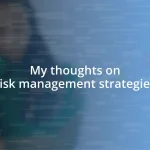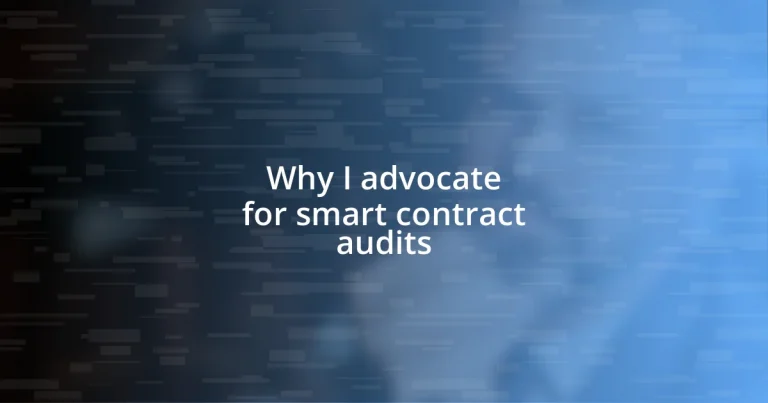Key takeaways:
- Smart contracts enhance efficiency, transparency, and fairness in transactions, reducing reliance on human intermediaries.
- Conducting thorough audits is critical for identifying vulnerabilities like reentrancy and gas limit issues, which can prevent significant financial losses.
- Choosing a reputable audit service that offers detailed communication and a tailored approach is essential for effective smart contract evaluation and compliance.
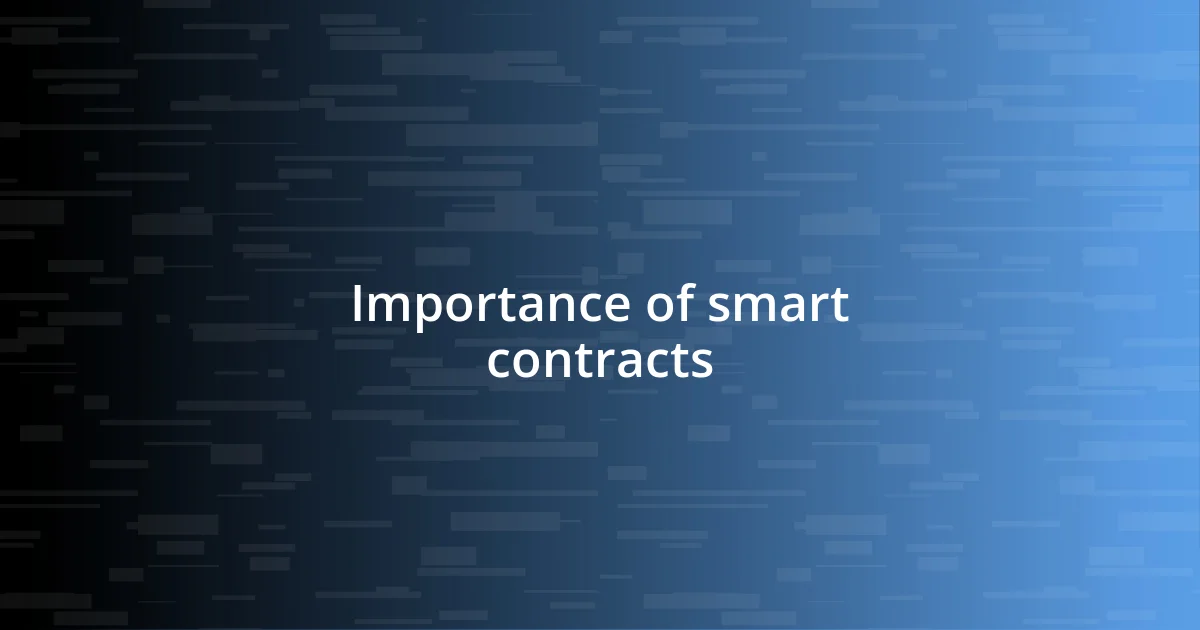
Importance of smart contracts
Smart contracts have revolutionized how we think about agreements and transactions. I remember the first time I witnessed a smart contract in action—it was like watching magic unfold. The transparency and automation they offer eliminate the need for intermediaries, and you can truly feel the empowerment that comes with being in control of your agreements.
When I reflect on the importance of smart contracts, I can’t help but think about the efficiency they bring to various industries. Suddenly, processes that once took days or even weeks can be executed in mere moments. Doesn’t it feel liberating to know that trust can be built into software rather than relying solely on human beings? This shift is especially significant in sectors like supply chain management, where tracking the flow of goods becomes seamless and secure.
Moreover, smart contracts promote fairness by removing biases that might influence traditional contracts. I can’t tell you how many times I’ve seen disputes become messier simply because human emotions were involved. With smart contracts, terms are clear and enforced automatically, which promotes a sense of justice in all parties involved. Isn’t it reassuring to think that complex transactions can now be simplified and safeguarded by code?
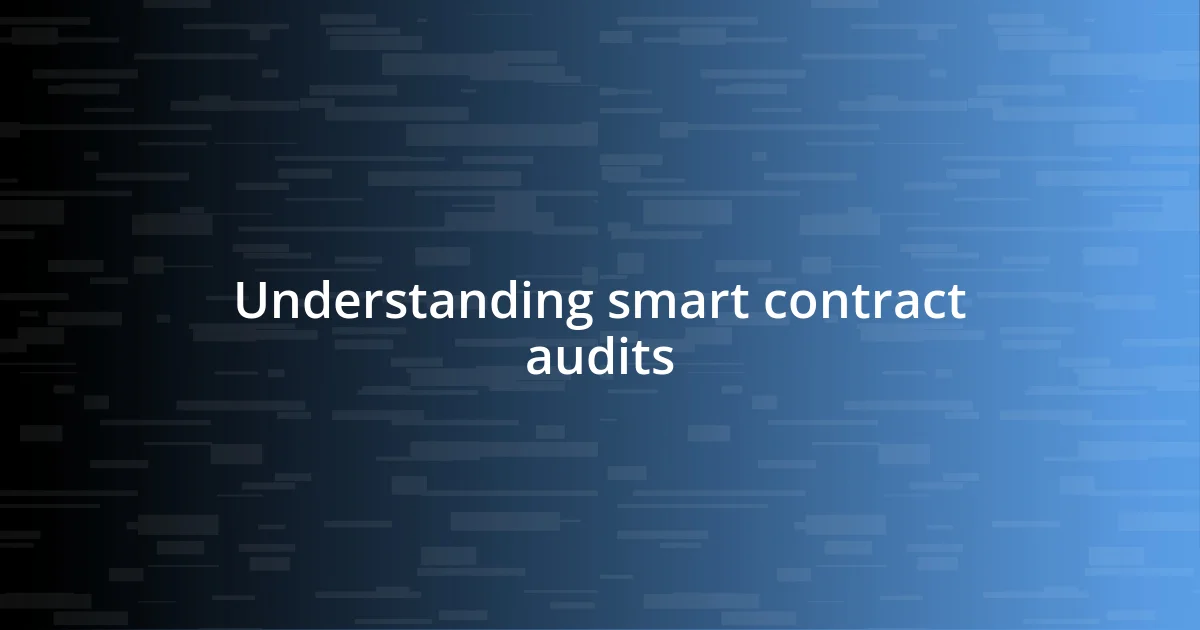
Understanding smart contract audits
Understanding smart contract audits is crucial in ensuring the reliability of these digital agreements. I vividly remember a project where we launched a smart contract without an audit, and it was exciting until we discovered a vulnerability that could have led to significant losses. That was a real wake-up call! An audit objectively examines the code for errors and vulnerabilities, giving developers and users peace of mind before launch.
- Error Detection: Auditors identify flaws in the code that could lead to unintended behaviors.
- Security Assurance: They assess the contract’s security measures, helping to prevent attacks.
- Compliance Check: Audits ensure that the contract aligns with legal and regulatory standards.
- Trust Building: A well-audited contract instills confidence in users, which is essential for broader adoption.
On a deeper level, the audit process often feels like a safety net. I remember how relieved I felt when our latest audit revealed that our code was solid, allowing us to move forward without the fear of potential pitfalls. Knowing that a third-party expert had examined our smart contract brings a comforting layer of trust to the whole framework. In the fast-paced world of blockchain, this step can truly make or break a project.
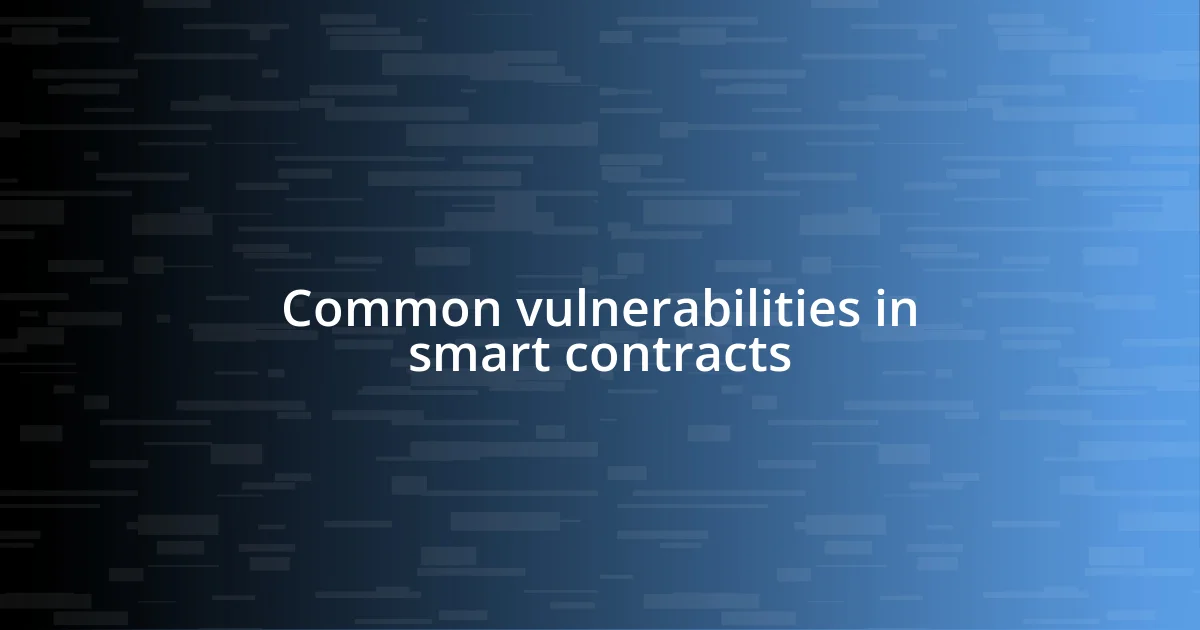
Common vulnerabilities in smart contracts
Smart contracts, while groundbreaking, can be susceptible to specific vulnerabilities that, if left unchecked, can lead to catastrophic outcomes. I recall a project where a simple reentrancy attack nearly drained our smart contract’s funds. It’s astonishing how just a small oversight can open the door to such risks. Vulnerabilities like these highlight the need for thorough audits before deployment to safeguard against unexpected exploits.
Another common vulnerability I’ve seen is the improper management of gas limits. I remember a time when we underestimated the gas required for a transaction, which rendered our contract unusable for certain users. The frustration among team members was palpable, reminding me that even minor technicalities could lead to major complications. Understanding and fixing these vulnerabilities not only secures the contract but also enhances user experience, which is so vital in maintaining trust.
Then there are issues like timestamp dependence, where contracts rely on block timestamps for critical functions. I learned the hard way that these can be manipulated by miners, leading to unintended consequences. It’s a sobering thought—imagine building a project on shaky foundations! This is why recognizing and addressing these vulnerabilities is crucial for building robust and resilient smart contracts.
| Vulnerability | Description |
|---|---|
| Reentrancy | A type of attack where a contract calls another contract, allowing the attacker to manipulate state before the first call finishes. |
| Gas Limit Issues | Problems arising from incorrectly estimated gas costs, causing transactions to fail or become expensive for users. |
| Timestamp Dependence | Reliance on block timestamps that can be altered by miners, potentially leading to unpredictable outcomes. |
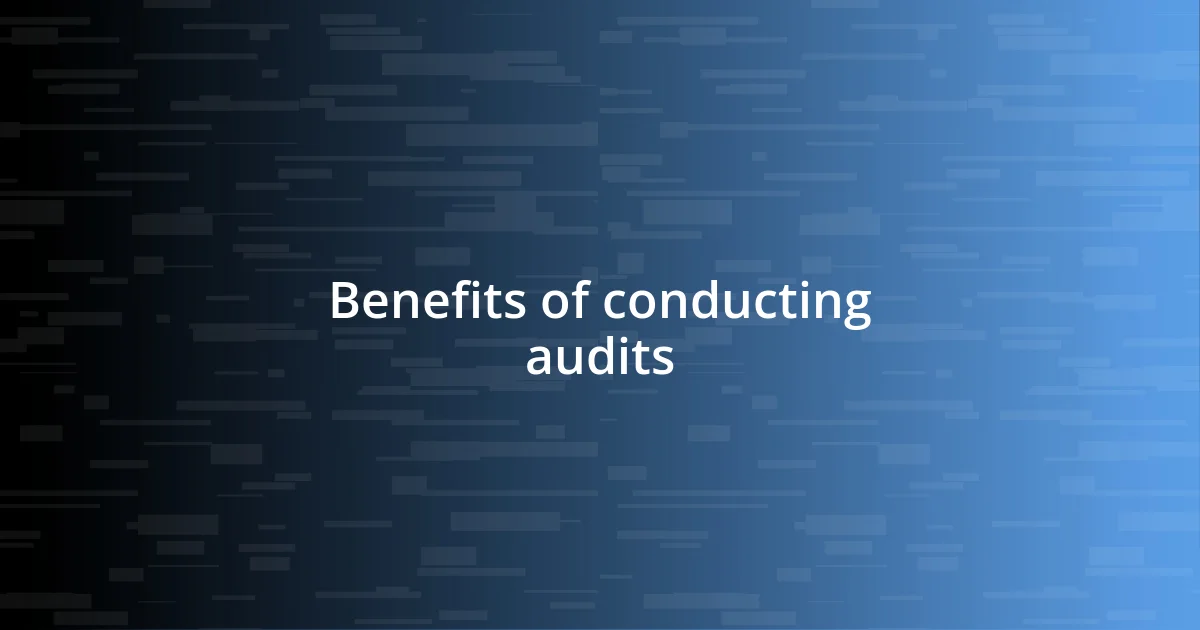
Benefits of conducting audits
Conducting smart contract audits offers the invaluable benefit of error detection, which can save teams from potentially costly mistakes. I remember when we uncovered a single line of code that could have created significant vulnerabilities in our contract. It’s eye-opening how something seemingly small can lead to huge issues, and the audit was our safeguard against that.
Another major advantage is the security assurance that comes from having an expert scrutinize your contract. An experience I had was particularly enlightening; it was during a project where the audit revealed several overlooked security gaps. The sense of relief that washed over me showed just how crucial these audits are in bolstering confidence—not only for developers but also for users putting their trust in our technology. Would you want to launch without that kind of peace of mind? I certainly wouldn’t.
Additionally, audits offer a compliance check that ensures smart contracts adhere to legal standards, which is another layer of protection I highly recommend. In an industry where regulations are constantly evolving, I’ve found that staying compliant is just as important as coding correctly. There’s a comforting assurance in knowing that we’re operating safely within legal boundaries. The thought of running afoul of regulations is daunting and often keeps me up at night, but an audit helps alleviate that anxiety significantly.
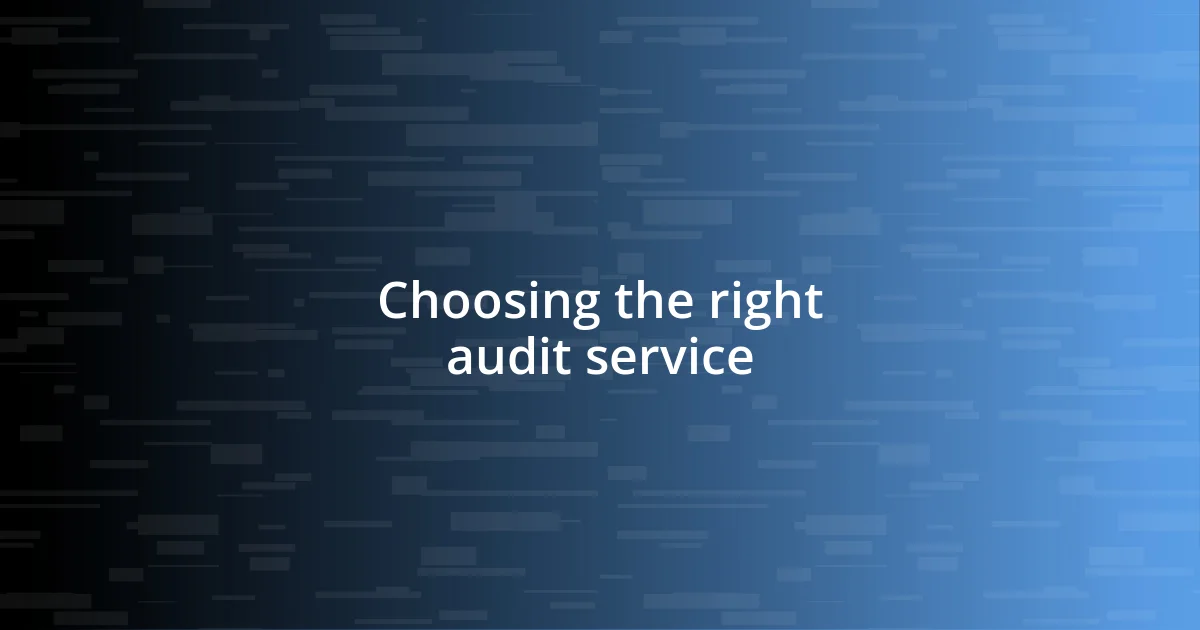
Choosing the right audit service
When it comes to choosing the right audit service, I can’t stress enough the importance of looking for a firm with a strong reputation and proven experience in the smart contract space. I remember when I first entered this world, and I quickly learned that not all auditors are created equal. Take the time to research their past audits and client testimonials; this can save you from potential headaches down the line.
Another crucial factor is the level of detail and communication the audit team offers. I once worked with an auditing service that provided only a checklist of issues without explaining their impact. It left me feeling frustrated and more confused than when I started. Choose a service that not only identifies vulnerabilities but also walks you through their findings, helping you understand the implications in layman’s terms.
Don’t overlook the importance of a tailored approach to your specific project. In my experience, a one-size-fits-all audit doesn’t cut it. I recall a project where a generic audit missed challenges unique to our contract’s architecture. Ask potential auditors how they adapt their processes to fit your needs. Are they willing to go the extra mile to ensure they fully grasp your project’s nuances? That extra effort often makes a world of difference.
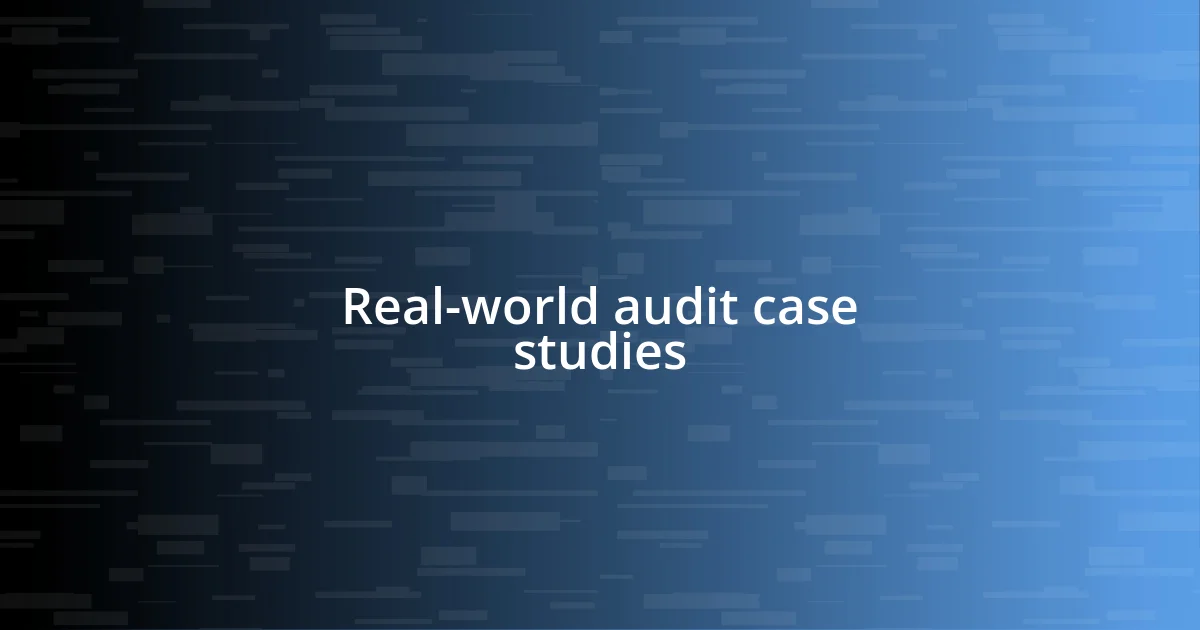
Real-world audit case studies
One compelling case study that comes to mind is the audit of a decentralized finance (DeFi) platform that mistakenly deployed a contract with a critical flaw. I was part of the team that conducted the audit, and we discovered a reentrancy vulnerability—something that could have allowed hackers to drain funds. It was a nerve-wracking moment leading up to the reveal, but the relief we felt after pinpointing that issue was immense. Imagine the potential chaos if the project had launched without our findings!
In another instance, a mid-sized blockchain startup sought our help for a routine audit before launching their new token. During the process, we found an off-by-one error, a mistake that can easily go unnoticed. As I examined the implications of that error, I thought about all the trust users place in such products. The direct correlation between our audit and the startup’s successful launch made me appreciate the real-world impact of thorough audits.
Lastly, there was a project I worked on that had already gone live but encountered unexpected behavior during peak usage. We dug deep into the smart contracts and uncovered logical flaws that hadn’t been apparent initially. I can’t help but wonder how many projects are left vulnerable to unforeseen failings simply because audits are overlooked. This moment solidified my understanding that regular audits, even post-launch, can be vital in preserving user trust and project integrity.






